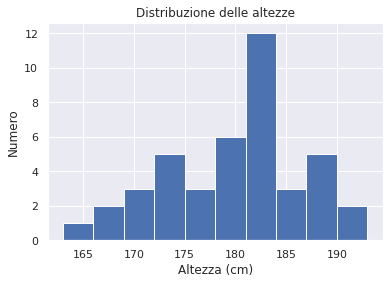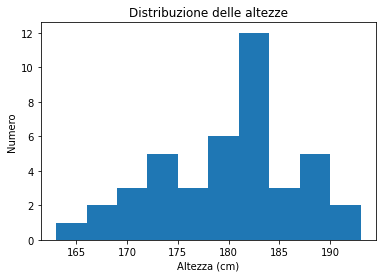Importa le librerie
import numpy as np import pandas as pd
Carica il file dei dati
data=pd.read_csv("president_heights.csv")
Dai un’occhiata
print(data)
order name height(cm)
0 1 George Washington 189
1 2 John Adams 170
2 3 Thomas Jefferson 189
3 4 James Madison 163
4 5 James Monroe 183
.. .. ... ...
37 40 Ronald Reagan 185
38 41 George H. W. Bush 188
39 42 Bill Clinton 188
40 43 George W. Bush 182
41 44 Barack Obama 185
Estrai le altezze
heights=np.array(data["height(cm)"]) print(heights) [189 170 189 163 183 171 185 168 173 183 173 173 175 178 183 193 178 173 174 183 183 168 170 178 182 180 183 178 182 188 175 179 183 193 182 183 177 185 188 188 182 185]
Informazioni statistiche
print("Altezza minima :", heights.min())
print("Altezza media :", heights.mean())
print("Altezza massima :", heights.max())
print("Deviazione standard:", heights.std())
Altezza minima : 163
Altezza media : 179.73809523809524
Altezza massima : 193
Deviazione standard: 6.931843442745892
Ancora…
print("Primo quartile (25%):", np.percentile(heights, 25))
print("Mediana :", np.median(heights) )
print("Terzo quartile (75%):", np.percentile(heights, 75))
Primo quartile (25%): 174.25
Mediana : 182.0
Terzo quartile (75%): 183.0
Grafici
import matplotlib.pyplot as plt
plt.hist(heights)
plt.title('Distribuzione delle altezze')
plt.xlabel('Altezza (cm)')
plt.ylabel('Numero');
plt.show()
Aggiungi le impostazioni grafiche di seaborn
import matplotlib.pyplot as plt
import seaborn as snc
snc.set()
plt.hist(heights)
plt.title('Distribuzione delle altezze')
plt.xlabel('Altezza (cm)')
plt.ylabel('Numero');
plt.show()

Vedi: https://jakevdp.github.io/PythonDataScienceHandbook/02.04-computation-on-arrays-aggregates.html
